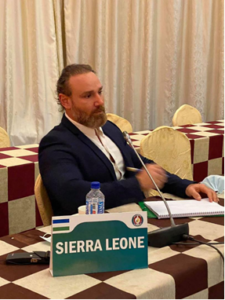By Kadiatu Sankoh
During an interview, John Shallop, the National President of the Sierra Leone Association of Hotels (SLAH), discussed the background and progress of the association. The Sierra Leone Association of Hotels is an umbrella body under which all hotels in the country fall, governing their operations and activities.
The association has existed for a long time. In the past, it primarily focused on hotels. However, as the hospitality sector grew, more players such as beach bars, guest houses, casinos, and chef associations began to emerge. This led to the decision to form a broader umbrella organization the Sierra Leone Hospitality and Tourism Association (SLATA) to govern all sectors within hospitality and tourism.

SLATA includes stakeholders from all sectors and is not based solely in Freetown; regional presence was prioritized. The association extended its reach to the southern, eastern, and northern regions, making appointments in these areas. Monthly meetings are held to discuss programs and challenges, and they work together to find solutions.
As SLATA grew, many stakeholders came on board. It became widely recognized by the Ministry of Tourism, the World Bank, and even regional bodies in West Africa for its efforts and contributions. To further strengthen collaboration, they decided to form a federation.
Within SLATA, various sub-associations were formed, and these were grouped to create a federation. This federation comprises all the associations under one umbrella. A rebranding of the Hotel Association was carried out through several consultative meetings.
Although building the federation has not been easy, due to the presence of over 21 associations with ongoing issues, the leadership has worked tirelessly over the years. They are now at the stage of selecting a date for elections.
Two months ago, the Hotel Association held a general meeting at Lagonda, where all hotels from across the regions were present.
John Shallop emphasized that building a federation is a complex task. The association remains neutral in its processes and hopes for no interference, as it is a private-sector initiative. Among the major challenges facing the sector is the lack of investment in five-star hotels, largely due to the high cost of travel to Sierra Leone, which affects tourism and investment growth.
Another critical challenge is electricity—unreliable power supply hampers operations. Multiple taxation from different ministries also burdens the sector. However, the association’s key achievements include establishing regional offices, which have significantly improved communication.
The association has also taken note of the delays between NGO payments and the NRA, and efforts are underway to resolve these issues. Creating job opportunities for youth in Freetown and the regions is another notable achievement.
Samuel A. Goba, National Vice President for the Southern Region, highlighted the region’s success, mentioning that there are almost 20 hotels up to standard, which is a significant achievement for the federation. He also noted challenges faced by hotel managers, including electricity supply issues, high fuel and generator costs, and inadequate water supply. He appealed to the Government of Sierra Leone for support in this regard. Multiple taxes remain a pressing concern in his region as well.
Patrick Senesie, Vice President for the Eastern Region (Kenema District), stated that the region is performing well. They have a five-star hotel, and electricity and water supply are not major issues. However, he noted that the road network remains a significant challenge.
Ms. Annette Iye Bangura, Vice President for the Northern Region, outlined their challenges but also emphasized the progress in the tourism sector in recent years. She stressed the importance of having the association speak with one voice, channeling issues collectively, and working as a team to find solutions.